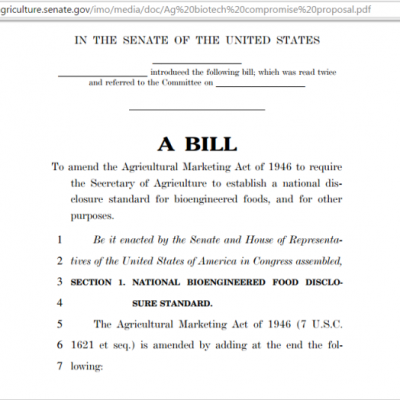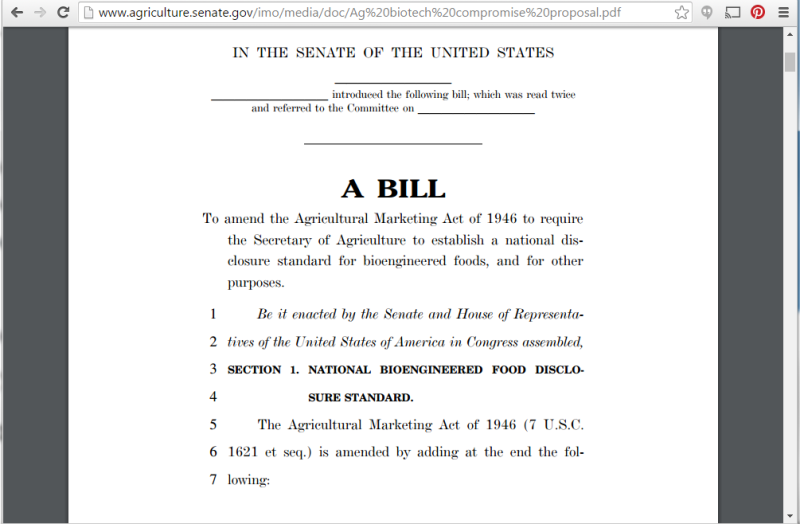One of the more public and politically-charged issues regarding the modern food movement is the safety, use, and labeling of genetically modified organisms (GMOs) in our food. In 2015, Vermont passed a bill requiring the mandatory labeling of foods that contain GMOs. Specifically, the law required packaged grocery products and whole fruits and vegetables that contain genetically modified foods to be labeled as such directly on the packaging. The law officially went into effect July 1st, 2016.
However, on July 6th the Senate voted for a bill that mandates the labeling of GMOs much differently. Much to the dismay of supporters of the Vermont law, the new Senate bill has laxer labeling requirements, allowing food companies to choose how they disclose the use of GMOs from a variety of methods, including QR codes (that can be scanned with smartphones), 800 numbers, websites, and of course on-package labels. The labeling requirements would not include products that are primarily meat. The bill explicitly takes away states’ right to enact their own laws for GMO labeling, hence the end of the Vermont law.
The new bill is — predictably — supported by the industrial agriculture industry. In a time where pressure to label GMOs grows steadier daily, the bill mandates labeling in a way that allows these companies to make the labeling as subtle and hard-to-access as possible. Furthermore, the bill proposes no penalties should companies be found in noncompliance.
Opponents of the bill claim that it threatens consumers’ right-to-know what is in their food, as well as infringes upon states’ rights, and could prevent companies who wish to label their products non-GMO from doing so. The Center for Food Safety is a strong opponent of the bill, claiming it violates constitutional rights and contains misleading information. Vermont Senator Bernie Sanders, who supported his own state’s GMO labeling law, has spoken out as one of these opponents. The Organic Consumers Association took to the Senate floor on Wednesday to protest the bill, by throwing $2000 onto the floor to send the message to Senators to “listen to the people, not Monsanto”.
Meanwhile, large food companies support the bill as well. Campbell’s, who we previously reported came out in January in support of GMO labeling, supports the bill, which seems strange considering it is much less transparent than most consumers have demanded, and despite Campbell’s claims that it supports GMO labeling in order to meet consumers’ wishes.
The bill must still receive final approval from the Senate, pass through the House of Representatives, and head to President Obama for signing. It’s unclear whether the bill will make it into law, but if it does it will be the first national standard for GMO labeling, something many food and biotech companies now wish to happen.
If you’d like to make your voice heard in opposition to the bill, now is the time to contact your US congressmen and express your disapproval. Until a national standard is set that provides true transparency, and makes it easy to determine how food was produced, the best way to ensure you know what you’re eating is to get your food from—and get to know—a local farmer.
What do you think? Do you support mandatory GMO labeling? Do you think the new Senate bill goes far enough? Let us know!
However, on July 6th the Senate voted for a bill that mandates the labeling of GMOs much differently. Much to the dismay of supporters of the Vermont law, the new Senate bill has laxer labeling requirements, allowing food companies to choose how they disclose the use of GMOs from a variety of methods, including QR codes (that can be scanned with smartphones), 800 numbers, websites, and of course on-package labels. The labeling requirements would not include products that are primarily meat. The bill explicitly takes away states’ right to enact their own laws for GMO labeling, hence the end of the Vermont law.
The new bill is — predictably — supported by the industrial agriculture industry. In a time where pressure to label GMOs grows steadier daily, the bill mandates labeling in a way that allows these companies to make the labeling as subtle and hard-to-access as possible. Furthermore, the bill proposes no penalties should companies be found in noncompliance.
Opponents of the bill claim that it threatens consumers’ right-to-know what is in their food, as well as infringes upon states’ rights, and could prevent companies who wish to label their products non-GMO from doing so. The Center for Food Safety is a strong opponent of the bill, claiming it violates constitutional rights and contains misleading information. Vermont Senator Bernie Sanders, who supported his own state’s GMO labeling law, has spoken out as one of these opponents. The Organic Consumers Association took to the Senate floor on Wednesday to protest the bill, by throwing $2000 onto the floor to send the message to Senators to “listen to the people, not Monsanto”.
Meanwhile, large food companies support the bill as well. Campbell’s, who we previously reported came out in January in support of GMO labeling, supports the bill, which seems strange considering it is much less transparent than most consumers have demanded, and despite Campbell’s claims that it supports GMO labeling in order to meet consumers’ wishes.
The bill must still receive final approval from the Senate, pass through the House of Representatives, and head to President Obama for signing. It’s unclear whether the bill will make it into law, but if it does it will be the first national standard for GMO labeling, something many food and biotech companies now wish to happen.
If you’d like to make your voice heard in opposition to the bill, now is the time to contact your US congressmen and express your disapproval. Until a national standard is set that provides true transparency, and makes it easy to determine how food was produced, the best way to ensure you know what you’re eating is to get your food from—and get to know—a local farmer.
What do you think? Do you support mandatory GMO labeling? Do you think the new Senate bill goes far enough? Let us know!






